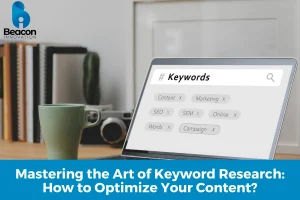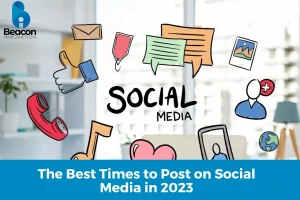Social media isn’t just about posting updates and engaging with followers—it’s also a powerful tool for boosting your search engine rankings. This process, known as social media SEO, involves optimizing your social media profiles and posts to enhance visibility both on social platforms and in search engine results.
How Social Media Impacts SEO?
While social media metrics like followers and shares don’t directly influence Google rankings, they can still play a crucial role in your SEO strategy:
Increase Brand Searches:
When users engage with your brand on social media, they’re more likely to search for it on Google. This increased search volume is a clear indicator of growing interest in your brand, which can positively influence your site’s search rankings. As more users actively search for your brand, search engines recognize the rising relevance and authority of your site, leading to better visibility in search results.
Moreover, heightened brand searches often signal to search engines that your content is valuable and trustworthy. This can lead to improved organic search rankings and greater overall visibility. By fostering strong engagement on social media, you can create a cycle of increased searches and improved rankings, further amplifying your brand’s online presence.
Drive Organic Clicks:
Engaging content on social media not only attracts attention but also encourages users to click through to your website from Google search results. When users interact with your social media posts—whether through likes, comments, or shares—they are more likely to visit your website for more information, increasing your click-through rates (CTR) on search engine results pages (SERPs).
The relationship between social media engagement and organic clicks is symbiotic. The more users engage with your content on social media, the higher the likelihood they will click on your website links when they appear in search results. This increased CTR can further enhance your site’s SEO performance, creating a positive feedback loop that benefits both your social media and search engine visibility.
Build Authority:
Consistently posting valuable and relevant content on social media helps establish your authority in your niche, a factor that Google highly values. By regularly sharing expert insights, industry updates, and useful information, you demonstrate your expertise and build trust with both your audience and search engines. This authority is a key component of Google’s E-E-A-T (Experience, Expertise, Authoritativeness, and Trustworthiness) criteria.
Building authority through social media also involves engaging with your audience and addressing their questions and concerns. This not only enhances your reputation as an expert but also signals to Google that your content is credible and relevant. As you build your authority, your site’s search rankings are likely to improve, reflecting the trust and value you’ve established in your field.
Generate Backlinks:
Popular content on social media is more likely to be shared and linked to by other websites, leading to valuable backlinks. These backlinks are a crucial element of SEO, as they act as endorsements from other sites, signaling to Google that your content is worth referencing. The more your content is shared and linked, the more authoritative and trustworthy your site appears to search engines.
In addition to enhancing your site’s authority, backlinks from reputable sources can drive significant traffic to your website. As other websites reference your content, their audiences are more likely to visit your site, further boosting your visibility and SEO performance. Effective social media strategies that encourage sharing and linking can lead to a robust backlink profile, which is vital for long-term SEO success.
Inform Your SEO Strategy:
Social media provides valuable insights into which topics and types of content resonate most with your audience. By analyzing social media metrics, such as engagement rates and popular themes, you can tailor your SEO strategy to align with your audience’s interests and preferences. This data-driven approach helps ensure that your content is both relevant and engaging.
Additionally, social media insights can guide keyword research and content creation. Understanding what your audience finds compelling allows you to develop targeted content that addresses their needs and interests, improving your chances of ranking well in search results. By integrating social media feedback into your SEO efforts, you create a more cohesive and effective strategy that drives better results.
Enhance Local SEO:
For local businesses, positive social media engagement and reviews can significantly boost your local search rankings on Google Maps. Encouraging satisfied customers to leave reviews and interact with your business on social media helps increase your visibility in local search results. Positive reviews and high engagement rates signal to Google that your business is reputable and valued by the local community.
Moreover, social media can enhance your local SEO efforts by driving traffic to your website and increasing your business’s overall online presence. Engaging with local customers and sharing location-specific content can further improve your local search rankings, helping potential customers find and connect with your business more easily. Leveraging social media for local SEO is an effective way to build a strong local presence and attract more customers in your area.
Top Social Media Platforms for SEO
Here are the top nine social media platforms that can boost your SEO efforts:
- YouTube: As a search engine itself, YouTube videos often appear in Google search results. Optimize your video titles, descriptions, and tags to rank higher both on YouTube and Google.
- X (formerly Twitter): X’s search function allows users to find tweets, profiles, and trends. Use relevant keywords and hashtags in your posts to increase visibility, and interact with trending topics to gain traction.
- Instagram: Instagram is a visual search powerhouse. Optimize your profile with relevant keywords, use effective hashtags, and ensure your images have descriptive alt text to improve discoverability.
- Facebook: Facebook’s search results are influenced by user activity. Post meaningful content, use appropriate filters, and build trust to improve your profile’s visibility.
- LinkedIn: Ideal for B2B marketing, LinkedIn’s search algorithm favors detailed and relevant company profiles. Use varied content formats and engage with your audience to boost your presence.
- Pinterest: With its focus on visual content, Pinterest is great for driving traffic. Create eye-catching Pins, use relevant keywords in descriptions, and post regularly to stay visible.
- Reddit: Reddit’s diverse communities can help your content reach a niche audience. Contribute valuable posts and comments to gain visibility and drive traffic.
- TikTok: Especially popular among younger users, TikTok is increasingly used as a search engine. Use trending hashtags, effects, and keywords to make your videos more discoverable.
- Quora: By providing helpful answers to relevant questions, you can drive traffic to your site and improve visibility. Use a company account and avoid overly promotional content.
Tips for Integrating SEO and Social Media
To maximize your SEO and social media efforts:
- Link Social Profiles to Your Site: Ensure your social media profiles link back to your website and vice versa.
- Repurpose Content: Adapt content from your website for social media and use social posts to drive traffic to your site.
- Add Social Sharing Buttons: Make it easy for users to share your content across social media.
- Maintain Consistent Branding: Keep your branding consistent across both your website and social media profiles.
- Optimize Social Media Posts: Use relevant keywords and hashtags in your social media posts to improve discoverability.
- Verify Accounts: Verified social media accounts are more likely to be displayed in search results.
Streamline Your Social Media SEO Strategy
To effectively manage your social media SEO, consider using tools like Semrush Social, which offers features like:
- Poster: Schedule posts across multiple platforms.
- Tracker: Compare your social performance with competitors.
- Analytics: Get detailed insights into your social media metrics.
- Inbox: Manage messages from various social media platforms in one place.
By integrating these strategies and tools, you can enhance and utilize the power of social media SEO and improve your search engine rankings, driving more traffic and engagement to your brand.
Read: Best Techniques to Optimize your Youtube Shorts Like a Pro


